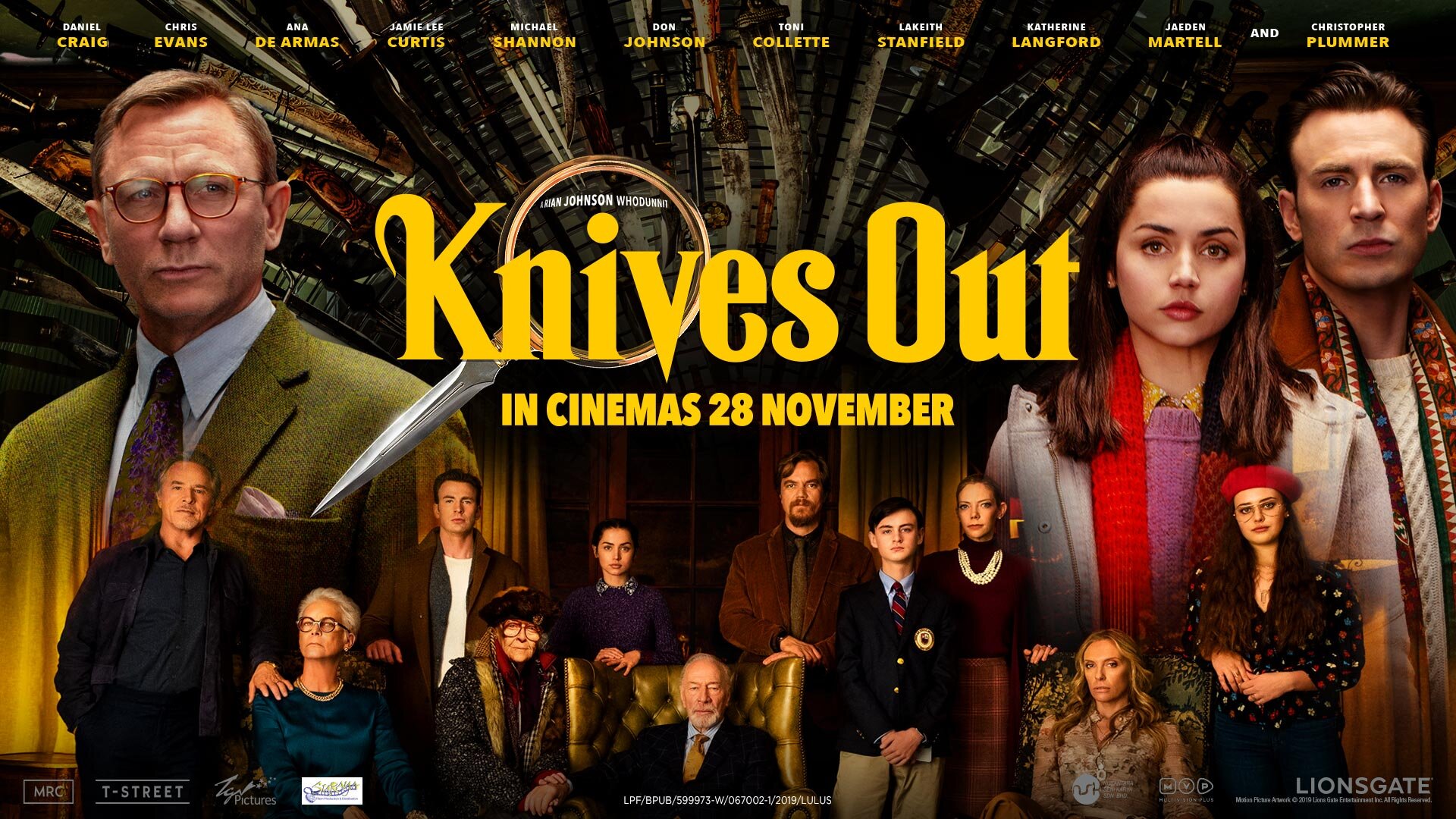Review: Knives Out
Written by Grace Leahy
I didn’t just have a feeling Rian Johnson’s Knives Out would be a blast: I knew.
This summer, I spent about 40 hr/week on a studio lot in L.A. (primarily in a tiny basement office, but we made it our own), reading and synthesizing scripts, taking phone calls, etc. So, I was surprised when the script for Lionsgate’s new whodunnit landed on my desk. My boss was working on a mystery movie, it turned out, and wanted to check out the competition. “Daniel Craig is attached to play the lead,” he told me, nodding his head with a hint of jealousy.
So I plowed through the script, unsure whether or not the film would pull off the comedy required of the ensemble cast, the heavy social and political commentary, and the transfer of murder mystery to the present day.
A few months later, Knives Out was closing out the Philadelphia Film Festival. I knew it’d be out Thanksgiving, but I couldn’t be more eager to see what I’d read hit the big screen. And better than that, writer-director Rian Johnson himself would be there. So we arrived an hour early for student rush ($7!) and managed to slip in right as the theater was filling up. Following the presentation of awards by directors of the Philadelphia Film Society, Johnson came onto the stage, wearing rainbow striped socks and permanent grin. Above all, he said he hoped we’d have fun, and I caught myself remembering that while films are such a pressing vehicle for social change, they are, after all, one of the best ways to lighten up, to laugh, to be entertained.
Upon first look, Knives Out has all the right pieces to succeed. Just in the opening scene, the camera jumps playfully around a victorian mansion, and within minutes we’re knee-deep into the investigative case, meeting the star-studded cast. Family members gather at the Poughkeepsie estate of Harlan Thrombey (Christopher Plummer), the great murder-mystery writer, to celebrate his 85th birthday. However, the story makes a sharp turn when Thrombey is found dead in his study, apparently suicide, and the drawling, eccentric, and mysterious detective Benoir Blanc (Daniel Craig) arrives on the scene to investigate.
“The guy practically in a Clue board,” Lakeith Stanfield points out, and he’s not wrong: the mise-en-scene is an absolute highlight -- decadently packed and richly juxtaposed with colorful props, all highlighted in opening scenes and throughout the film. Trapped doors, larger-than-life portraits, peculiar sculptures, and convenient trellises add immensely to the feel of the film: dark yet whimsical, fitted to enhance rather than distract from the imagination of the great author that inhabits it.
The ensemble cast is also critical to keeping the pace and hilarity of Knives Out, its success hinging on a few key performances. While there’s a danger in toying with these strongly archetypal characters, Rian Johnson pulls it off because they are very real, stripped-down versions of people we walk by every day (except for, I hope, the young alt-right troll, Walt’s son (Jaeden Lieberher)). You see some fault lines in characters like Meg (Katherine Langford), who falls a bit flat, but as a whole, the ensemble is strong, bouncing comically between conflicting stories, banter, and hypocritical slandering. Collecting all these stories, we have the detective duo of sensible (LaKeith Stanfield) and fanboy (Noah Segan). Within the family, we have daughter-in-law and broke beauty guru (Toni Collete), money-hungry publishing manager and son Walt (Michael Shannon), business-obsessed, egotistical daughter Linda (Jamie Lee Curtis), her frustratingly white husband Richard (Don Johnson), and their “trust-fund baby” son Ransom (Chris Evans). Really anchoring the film, though, are the good-hearted protagonist and confidante from a South American country no one can seem to remember, Marta (Ana de Armas), and, of course, Benoir Blanc. Though I think Great Nana’s (K Callan) performance may have had me laughing most of all.
While the political commentary threaded throughout Knives Out had the potential to be heavy-handed, Johnson pulls it off by balancing humor and gravity. Marta’s mother is an illegal immigrant, and Marta herself works for Harlan and his white, upper-class family, though she errs on the side of seeing the best in people. Good-natured Marta puts family above all else -- yet, we see her put on the spot by some of the Thrombeys, her self-designated family. So yes, the film depends greatly on Craig’s genre-specific role, but it really succeeds because we want Marta to succeed in life. The Hitchcock-esque plot devices employed by Johnson keep viewers on the edge of their seats, twisting and turning in unexpected ways. Just when we think he’s shown us his hand, we spend the latter half of the film in a tailspin, wondering if…well, you’ll have to find out.
While some of this feels overdone, and the characters are outrageous (especially Blanc), it’s best to let go and just enjoy this wild homage to a genre near-deceased.
At the film’s conclusion, we were all grinning. Johnson returned to the stage, revealing that he’d watched the last 30 minutes with us. He loved our laughter, our gasps, our shock when the culprit was revealed. From there, he answered a series of questions with candor and humor. He grew up on Agatha Christie novels, and since the great-uncle-who-was-a-colonel-in-the-war was a trope of her time, he wanted to pinpoint the tropes of ours. Each time he watches the film, he notices something new and different in the mise-en-scene. His experience of Daniel Craig was not stoic or Bond-esque, but hilarious and lighthearted -- he always got the feeling that Craig was ready to break the mold and try something new.
And ultimately, that’s exactly what Johnson managed to do with Knives Out: take a well-known genre, and test its bounds in a new time.
